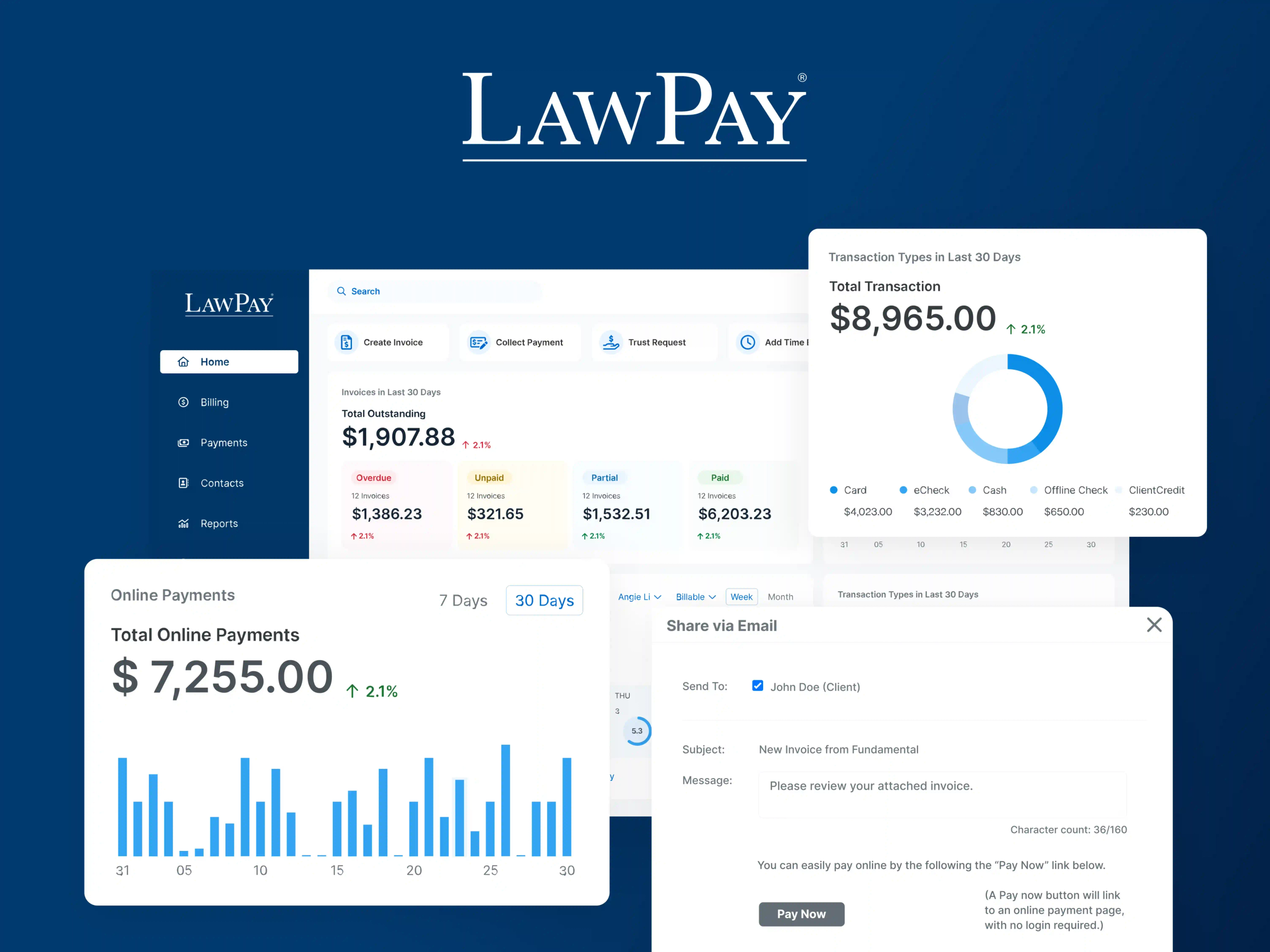Key takeaways
Law firms are increasingly accepting credit card payments from their clients.
To offset processing fees, credit card surcharges shift the costs of credit card transactions from the law firm to the client.
Credit card surcharges are legal in most jurisdictions, but they have caps and disclosure requirements.
To improve your billing and payment systems, your law firm may be part of a growing trend of accepting client credit card payments. According to our 2025 Legal Industry Report, 82% of respondents reported that their firms accept credit or debit card payments through online payment processing software, up from 78% the year before.
For law firms, accepting credit cards can be an effective way to combat non-payment among clients. Accepting credit cards can encourage faster payment by giving clients greater flexibility and convenience. These features reduce friction and can help increase payment rates. In fact, 59% of law firms said that accepting credit and debit cards increased their law firms’ collection rates.
Credit card surcharges are a popular option to help offset the costs of accepting credit cards; however, there is often confusion associated with applicable rules, which come from state law, network rules, and state bar rules, and whether or not it’s permissible in certain states. In this article, we’ll provide an overview of surcharge laws nationally, explain how to implement them at your firm, and discuss the regulations and ethical guidelines that apply to law firms when imposing credit card surcharges on clients.
What is a credit card surcharge?
A credit card surcharge is an extra fee a merchant adds to a customer’s bill to compensate for some costs of payment processing. Each time a merchant accepts and processes a credit card transaction, they pay a credit card processing fee.
Businesses can only apply surcharges to credit card transactions. It is a violation of card brand rules and some state laws to apply surcharges to debit or prepaid card transactions, even when the debit or prepaid card is treated like a credit card during checkout.
Surcharges are typically a percentage-based fee. For example, imagine a law firm that typically accepts cash or check payments from clients.
A customer with a $1,500 bill may request to pay with a credit card.
To accommodate the request, the law firm may charge the customer a 2% surcharge, which is $30.
The client’s final legal bill with a credit card would increase to $1,530.
Are credit card surcharges legal?
Yes, it is legal for merchants, including law firms, to charge credit card fees in most states. There has been litigation around surcharging, however.
For example, in 2017, a case involving passing on credit card fees to customers made it to the U.S. Supreme Court in Expressions Hair Design v. Schneiderman. New York business law prohibited surcharges on credit card transactions. Note: a new New York law has a similar effect today, as described in the following sections.
Expressions and several other businesses sued the state, arguing that the ban on surcharges violated their First Amendment rights.
In an 8-0 ruling, the Court stated that surcharge bans are laws that regulate speech, not conduct. Surcharge laws regulate speech by affecting how a business may communicate prices with its customers.
The Supreme Court sent the case back to an appellate court. The final ruling from the appellate court is that merchants may charge two different fees (a regular fee and a higher fee for credit cards) so long as the total price for using a credit card, inclusive of surcharge, is clearly communicated to customers.
While the dispute in that case arose from the law in New York, the Supreme Court’s ruling affected the laws at the time in many states (including through Attorney General interpretive opinions). Since that time, many states have updated their surcharging laws. Today, surcharge fees are legal in most states, although there may be stricter regulations on how a company applies them in different jurisdictions.
Credit card surcharge laws by state
The legal landscape of credit card surcharging fluctuates, but as of October 2025, credit card surcharging is legal in most states. However, there are nuances to be aware of. The following information highlights which states are experiencing changes in their surcharge rules, as well as the states where surcharges are legally permitted and prohibited.
When reviewing your state’s credit card surcharge laws, consider that these laws have frequently been challenged. Check your specific state Attorney General, legislature, or Consumer Protection Agency laws, as well as state bar opinions, for up-to-date information.
Note: Surcharges are governed by state law and card brand rules (like those published by Visa and Mastercard), each of which are subject to change. Attorneys are also subject to ethics rules and should check with their local bar association for the most updated information applicable to them. The following list, updated as of October 2025, provides legal professionals with updated information on the legal status of credit card surcharges specifically based on state law.
States where credit card surcharges are legal
In most states, it is legal for merchants to add a surcharge fee to customers’ bills. However, even though surcharge fees are legal, there are generally strict requirements.
States where surcharges are legal have limits on how much they can charge consumers (generally between 2%-3%). They must clearly communicate the surcharge fee to consumers in a place and manner where cardholders can see and acknowledge the surcharge before completing the transaction.
States A-L | States M-O | States P-Z |
Alabama | Maryland | Pennsylvania |
Alaska | Michigan | Rhode Island |
Arizona | Minnesota | South Carolina |
Arkansas | Mississippi | South Dakota |
California | Missouri | Tennessee |
Colorado | Montana | Texas |
DC | Nebraska | Utah |
Delaware | Nevada | Vermont |
Florida | New Hampshire | Virginia |
Georgia | New Jersey | Washington |
Hawaii | New Mexico | West Virginia |
Idaho | North Carolina | Wisconsin |
Illinois | North Dakota | Wyoming |
Indiana | Ohio | |
Iowa | Oklahoma | |
Kansas | Oregon | |
Kentucky | ||
Louisiana |
States where credit card surcharges are illegal
Currently, credit card surcharging is illegal in the following states and territories:
Connecticut
Maine
Massachusetts
New York (as currently interpreted)
Puerto Rico
As of February 11, 2024, it is illegal for New York merchants to separately list the pre-surcharge subtotal or even the separate line item surcharge amount. As mentioned below, listing the surcharge as a line item is required to comply with card brand rules. This means that, as of the time of writing, New York conflates “surcharging” with what is generally understood by the payments industry to be a cash discount model, while effectively banning “surcharging” as that term is understood by the industry and card brands. Local governments are authorized to enforce the law while keeping the proceeds, and each violation carries a fine of up to $500. This article provides detailed analysis regarding the specific restrictions and open questions arising from the new law in New York
How do credit card surcharges work?
A credit card surcharge is an increase in the customer’s bill. The prices listed by a business (for example, in an engagement letter) do not include surcharge fees for a credit card surcharge. These fees are added at the time of checkout and will lead to a higher bill than the customer originally expected.

What are the credit card surcharging rules set by card brands?
Major credit card brands like Visa and Mastercard set rules and regulations for merchants to follow when implementing surcharges. While there are slight variations among the major brands’ rules, the most relevant surcharging rules for merchants are largely the same across brands.
Notify Mastercard
You are required to provide Mastercard notice—in writing—about your intent to surcharge. You may write a letter to your financial account representative, and may be required to file paperwork provided on the credit card's website.
Failing to send notice of intent to surcharge violates Mastercard’s network rules. Breaking these rules can open your law firm up to financial penalties and possible regulatory penalties.
If you use a legal payment solution for credit card processing, like 8am™ LawPay, support teams can initiate the notification process on your behalf, saving you the first step.
Notify your clients
It's a legal requirement to make clients aware of your intention to surcharge. The explanation cannot be buried in a lengthy contract or disguised by the fine print.
In addition to financial and legal penalties, clients who weren’t notified beforehand can dispute the fee with their credit card issuer and initiate a chargeback request. In serious cases (those with egregious or repetitive violations), credit card companies may revoke your firm’s processing privileges.
You may avoid this by including the credit card surcharge on your invoice and displaying a sign at your office. It is also recommended that you disclose your surcharging practices in your engagement letter with clients. If you're using an online payment solution, you can add this notice to your payment page. Taking these proactive measures can help your law firm prevent chargebacks.
Do not surcharge more than the cost of your processing fee
This rule stipulates that you cannot use surcharging as a means to make a profit. In general, a surcharge cannot exceed 3% in the U.S. However, there are exceptions in some states to consider before implementing a surcharge fee.
For example, in Colorado, merchants may either:
Surcharge a maximum of 2%, or
Charge the actual cost the company pays for credit processing.
Surcharge caps are generally established at the state level, and law firms that don’t adhere to them risk fines and greater regulatory scrutiny.
Do not implement surcharges on debit or prepaid card transactions
Surcharge fees are strictly limited to credit card transactions only. Even if a client wishes to run a signature debit transaction, where a debit card is processed as a credit transaction, you are still not allowed to implement a surcharge. Surcharging is also not permitted with prepaid cards.
List surcharges as a separate line item
When drafting an invoice and tallying up transactions, you cannot lump the surcharge into the service's total cost. Credit card surcharges are required to be listed separately on your invoice and labeled clearly as a surcharge.
This practice reinforces transparency and clarifies to clients that they are being charged an additional fee for using a credit card. It also simplifies the reconciliation process for lawyers, allowing for easy tracking and recording of processing fees.
Stay PCI compliant
While not a surcharging rule per se, Payment Card Industry (PCI) compliance is an important credit card payment rule to be aware of. If your law firm accepts credit card payments, you are required to remain compliant with the Payment Card Industry Data Security Standard, or PCI DSS.
This set of security standards established by the major card brands ensures that all companies accepting, processing, storing, and transmitting credit card information maintain a secure environment to prevent stolen or compromised information.
As a result, your firm is required to complete an annual compliance questionnaire regarding how your office handles credit card information.
To remain PCI compliant, your attorneys must use reasonable measures to protect your clients’ sensitive information. This includes securing cardholder data, using a PCI-compliant payment system, establishing a secure network, and providing ongoing training to staff.
Simplify surcharging and PCI compliance with 8am™ LawPay
Surcharging compliance is ever-changing and anything but simple to navigate. But it doesn't have to be a point of stress for your firm. As a PCI Level 1 Service Provider, LawPay helps law firms with PCI compliance and surcharges through a suite of features and support.
As an end-to-end platform, our payment processing software fully integrates with our legal invoicing solutions. Smart features, including auto detection of debit and prepaid cards, limit the risk of violating surcharge laws in your jurisdiction.
Our built-in PCI questionnaire simplifies annual compliance, shortening reviews to just 5-10 minutes for many law firms. Together, these benefits save your law firm time, limit compliance risk, and provide a simpler payment solution to your clients.
At LawPay, we’re committed to ethical and secure credit card processing for law firms. To learn how we can help your firm, sign up today.
Schedule a demo to see what LawPay can offer your firm.
Get a demo
About the author
Gabriela is a creative and results-driven SEO specialist dedicated to helping small businesses and professional service firms excel online. She leverages over six years of digital marketing experience to provide in-depth, authoritative content required for regulated industries like accounting and legal technology. Her work focuses on bridging complex financial and compliance topics with clear, actionable guidance. The core aim of her content is to deliver compliant, data-driven strategies that help practitioners streamline their operations, maximize firm cash flow, and grow their online presence.

